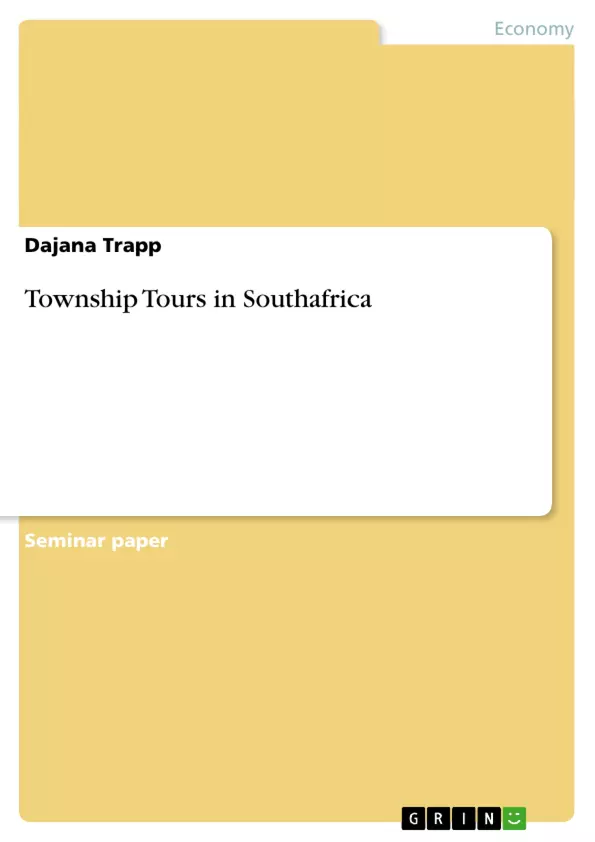„Ngiwu ambe umhlaba wonk ba, Ngaze ngaba tabela ngo sizi ebesinalo, Silubonile
nosizo Iwabe zizwe, Sithi enkosi, enkosi siyanbonga, rea leboha“ (Miriam
Makeba, „Masakhane“, 1998) In her Xhosa-song, Miriam Makeba addresses the Southafrican population to
build a new Southafrica. One that consists of a diversity of cultures which together shall
secure hope and future for all in the post-Apartheid era. Even if Southafrica is still miles
away from a future for all, more and more (especially black) Southafricans are becoming
more conscious of their own heritage and a history apart from the Apartheid. Those
Southafricans reach for a life without unemployment and discrimination and have
realized that they can only put this into reality through own work and strong will.
Although this process is only starting, those Southafricans represent a new Southafrica
and an awakened Southafrican identity. However, this growing pride needs to be treated
carefully; otherwise the façade of beautiful multi-culturalis m will only be a shield for
hiding the global, meaning the western American, culture. This would not only ridicule
the different Southafrican identities but also further the gap between rich and poor as
being decreed by nature.
Inhaltsverzeichnis (Table of Contents)
- Introduction
- Cultural Tourism
- Southafrica
- Demographics
- Development of Townships
- Today's situation
- Township Tours
- Problems with Township Tours
- Benefits from Township Tours
- Conclusion
Zielsetzung und Themenschwerpunkte (Objectives and Key Themes)
This text examines the complex and controversial issue of township tours in South Africa. The author delves into the cultural context surrounding these tours, exploring the historical and social factors that have contributed to their development.
- The role of cultural tourism in shaping perceptions of "authenticity"
- The impact of apartheid on South African society and its legacy in the development of townships
- The economic and social consequences of township tours for local communities
- The ethical implications of portraying South African townships as tourist destinations
- The importance of promoting cultural tourism in a sustainable manner
Zusammenfassung der Kapitel (Chapter Summaries)
- The introduction presents the context for the discussion by highlighting the desire for a new South Africa that embraces its diverse cultural heritage.
- The chapter on cultural tourism critically examines the concept of authenticity in tourism, exploring how stereotypes and the desire for "realness" can lead to a distorted view of the visited culture.
- The chapter on South Africa provides a background on the country's demographics and the development of townships under apartheid.
- The chapter on township tours analyzes the problems and benefits associated with this form of tourism, highlighting the potential for both economic gain and cultural exploitation.
Schlüsselwörter (Keywords)
This work explores key concepts such as cultural tourism, authenticity, stereotypes, apartheid, township development, economic benefits, social impacts, and the ethical dimensions of tourism in South Africa. It delves into the complexities of balancing economic opportunities with cultural preservation and the ethical considerations of showcasing disadvantaged communities for tourism purposes.
Frequently Asked Questions
What are the main ethical concerns regarding Township Tours?
The text discusses the potential for cultural exploitation and whether portraying disadvantaged communities as tourist destinations is respectful or merely a "shield" for western interests.
How did Apartheid influence the development of South African Townships?
Townships were developed as a result of Apartheid's segregation policies, creating a legacy of unemployment and discrimination that persists in the post-Apartheid era.
What are the potential benefits of Township Tours?
Benefits include economic gains for the local communities and the opportunity for black South Africans to share their heritage and history beyond the narrative of Apartheid.
What is the concept of "authenticity" in cultural tourism?
The text critically examines how the desire for "realness" can lead to stereotypes and a distorted view of the actual culture being visited.
Who is Miriam Makeba and why is she mentioned?
Miriam Makeba is a South African singer whose song "Masakhane" is used to highlight the spirit of building a new, multi-cultural South Africa based on hope and diversity.
- Arbeit zitieren
- Dajana Trapp (Autor:in), 2003, Township Tours in Southafrica, München, GRIN Verlag, https://www.grin.com/document/30845



